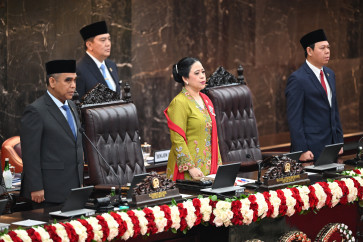Popular Reads
Top Results
Can't find what you're looking for?
View all search resultsPopular Reads
Top Results
Can't find what you're looking for?
View all search resultsSurrendering to thee, Ayyappa
Swamiye Saranam Ayyappa
Change text size
Gift Premium Articles
to Anyone
Swamiye Saranam Ayyappa. These words reverberate through the hills surrounding Sabari Malai (Sabari Hill) during December and January every year when pilgrims, in their millions, irrespective of caste, creed or religion, trek toward the holy abode of Lord Ayyappa, in the western ghats of Kerala, South India.
Recently, to commemorate the 18th Ayyappan Pooja (religious prayers) in Jakarta, the "Jakarta Ayyappa Sewa Sangam" (Jakarta Ayyappa Devotees' Committee) celebrated the annual Ayyappan Festival in Shiva Temple, Pluit, Jakarta, on a grand scale and with great religious fervor.
On this occasion, a special souvenir, tracing the origin and history of Sri Ayyappa in Jakarta, was also brought out by the committee.
Why is this 18th Ayyappan Pooja so special?
The number 18 has a particular significance in relation to Ayyappa tradition. There are 18 holy steps, symbolizing the 18 elements, which are to be climbed to reach the sanctum sanctorum of Sri Ayyappa temple in Mount Sabari.
While writing this, my mind travels back three decades to when I wrote an article for a respected Indian monthly on the growing influence of the Sasta (another name for Lord Ayyappa) cult.
I had then feared that this Hindu religious movement might taper off and lose its charm and excitement, by falling into known patterns and methods.
On the other hand, what I now see is that not only within India but even abroad, with the Indian diaspora spreading millions all over the world, the numbers of Lord Ayyappa's devotees have also swelled.
In Jakarta, the first Sri Ayyappan Pooja was conducted way back in January 1992 by a group of like-minded devotees, mostly south Indian expatriates.
Due to the great enthusiasm and excitement generated during that year, this religious festival was continued every year afterward.
It is pertinent to mention here that Indonesians of Tamil origin have been very active participants in all the Pooja activities, and they apparently find solace and comfort in keeping up with their religious and cultural heritage.
In 2001, acceding to the wishes of many devotees, the Jakarta Ayyappa Devotees' Committee decided to install the Lord's idol in Shiva Temple in Pluit, North Jakarta.
Accordingly, the idol, specially sculpted to strict Hindu scriptures, was shipped from India and was duly consecrated inside Shiva Temple, Pluit, on May 27, 2001, by the head priest of Sabari Malai who flew in from Kerala for this purpose.
Since then, prayers have been offered to the statue of Lord Ayyappa in Pluit temple.
The pilgrimage to Sabari Malai involves certain special austerities and religious rites for a period of 41 days.
Surprisingly, some similarities can be found between the Islamic fasting month and the traditions leading up to the pilgrimage to Lord Ayyappa temple in Sabari Malai.
During the month of Ramadan, Muslims are obliged to abstain from eating, drinking, smoking and engaging in sexual intercourse from dawn to dusk.
In the case of Lord Ayyappa's devotees, who are mostly males, it is ordained that they should observe a rigorous penance involving daily prayers, meditation and celibacy for a period of 41 days, called mandalam, preceding the pilgrimage. This applies not only to Hindus but also to other faiths undertaking the holy trek to Sabari Malai.
Such austerities help the pilgrim to control his impulses and develop good behavior, leading to moral and spiritual upliftment.
Another interesting feature of Sabari pilgrimage is that all the devotees are expected to pay their homage to the Muslim God Vaavar first -- before proceeding to the temple of Lord Ayyappa!
Can there be any better example of religious tolerance of the people?
There is yet another unique feature in Sabari Malai. On Jan. 14 every year, without fail, there is a celestial light, called "Makara Jyothi", which miraculously appears on the eastern horizon in the sky.
Devotees believe that witnessing the Makara Jyothi brings them good luck and divine blessings.
Blessed are the devotees of Lord Ayyappa in Jakarta that they now have the good fortune of having an Ayyappan temple right in the middle of their city.



